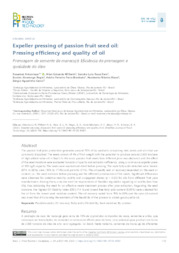Expeller pressing of passion fruit seed oil: Pressing efficiency and quality of oil.
Expeller pressing of passion fruit seed oil: Pressing efficiency and quality of oil.
Author(s): ANTONIASSI, R.; WILHELM, A. E.; REIS, S. L. R.; REGIS, S. A.; FARIA-MACHADO, A. F. de; BIZZO, H. R.; CENCI, S. A.
Summary: The passion fruit juice production generates around 70% of by-products comprising rind, seeds and arils that are commonly discarded. The seeds consist of 4% of fruit weight with the potential to produce around 2,500 ton/year of high added-value oil in Brazil. In this work, passion fruit seeds from different juice manufacturers and the effect of the seed moisture were evaluated towards oil quality and extraction efficiency, using a continuous expeller press of 100 kg/h capacity. The seeds were washed and dried before pressing. The main fatty acids detected were linoleic (67% to 68%), oleic (16% to 17.4%) and palmitic (11%). The oil quality and oil recovery depended on the seed oil content, i.e., the seed moisture before pressing and the different provenances of the seeds. Significant differences were observed for oxidative stability, acidity and conjugated dienes (p < 0.05) for oils from different fruit juice manufacturers. Among them, only one met the requirements of Brazilian regulation regarding oil acidity (less than 2%), thus indicating the need for an effective waste treatment process after juice extraction. Regarding the seed moisture, the highest Oil Stability Index (OSI) (7.4 h) and lowest free fatty acid content (0.63%) were obtained for the oil from the lowest seed moisture content. The oil recovery varied from 78% to 89% and the cake oil content was lower than 8% showing the elements of the feasibility of the process to obtain good quality oil.
Publication year: 2022
Types of publication: Journal article
Unit: Embrapa Food Technology
Observation
Some of Embrapa's publications are published as ePub files. To read them, use or download one of the following free software options to your computer or mobile device. Android: Google Play Books; IOS: iBooks; Windows and Linux: Calibre.
Access other publications
Access the Agricultural Research Database (BDPA) to consult Embrapa's full library collection and records.
Visit Embrapa Bookstore to purchase books and other publications sold by Embrapa.

